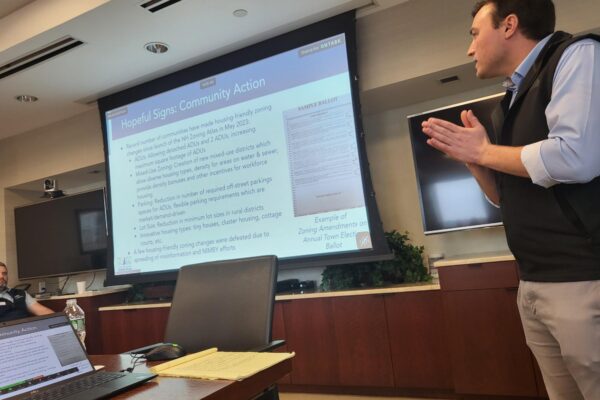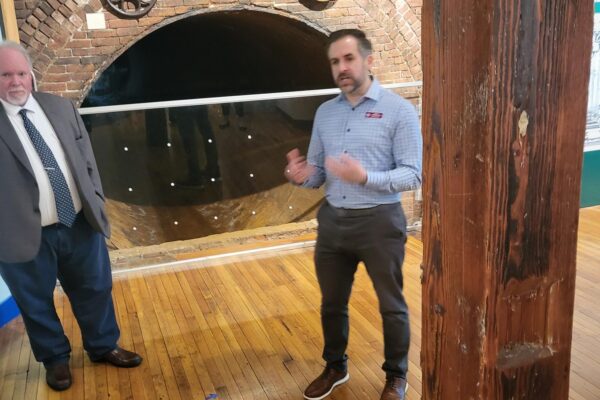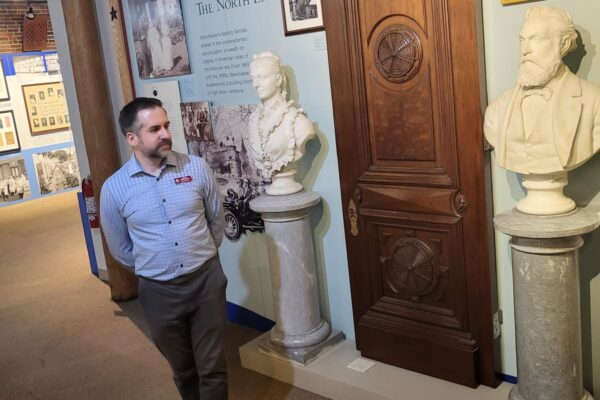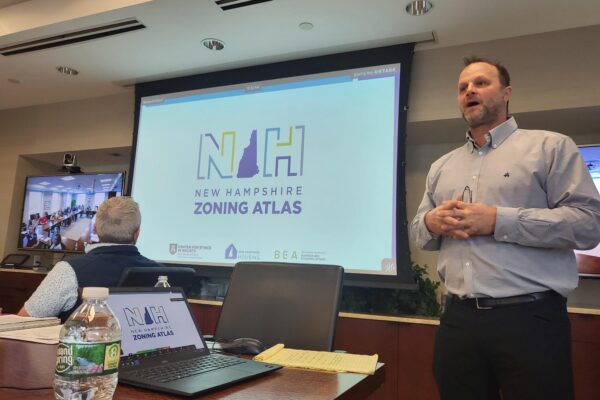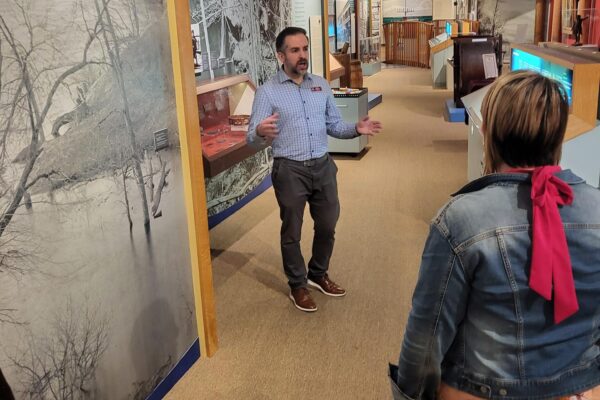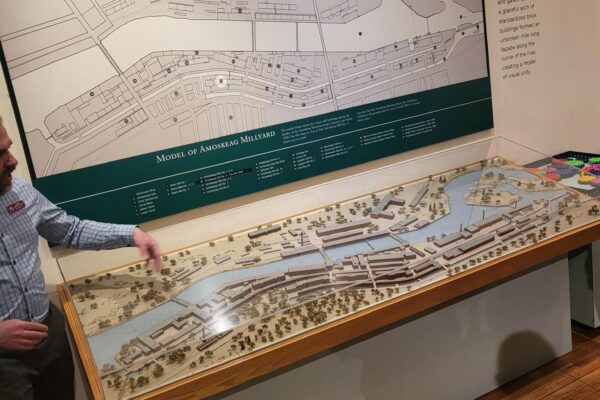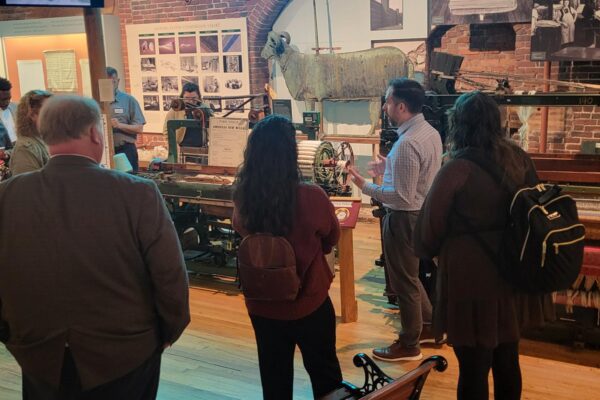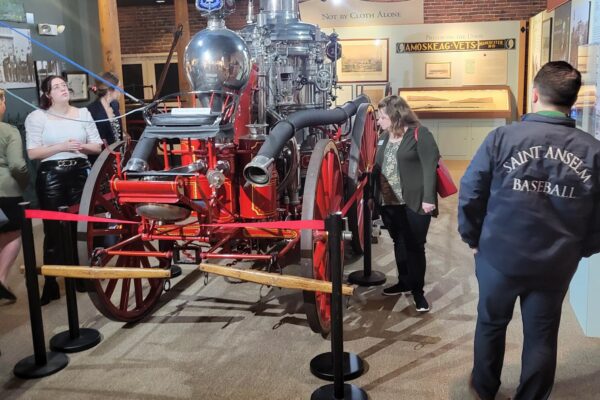This morning we started our last class of our Leadership of Greater Nashua Class of 2024. So hard to believe!
We began our Wednesday morning at the Manchester Millyard Museum where we were greeted by Jeff Barraclough who is the Executive Director of the Manchester Historic Association.
Opened in 2001, The Millyard Museum in Manchester, NH is a nonprofit with a mission to collect, preserve, and share the city’s history. They offer public tours and events throughout the year. The museum is supported by Donors, community members, corporate and government grants. The museum also relies on numerous volunteers who give their time and expertise.
We began our tour learning about the very beginning of the history of Manchester from the very place the Amoskeag Falls /Amoskeag manufacturing company existed. We took a walk-through of the earliest settlements to the present. It is here where they used the falls as a source of travel, food, and power to run the mill to make goods like cotton for fabrics, and even made rifles. Later years after the company filed bankruptcy and was repurchased, they progressed as a company including creating the first manual fire truck which progressed into the first steam powered fire engine, Cott beverages, Habitat Pea Coup company and Pandora Sweaters.
Our next stop was downtown Manchester, the Mclane Middleton Law offices. Here we meet Max Latonia the professor and executive director, Center for Ethics in Society at St. Anslem’s College. He is also joined by Nick Taylor.
They introduced us to the New Hampshire zoning atlas, an interactive database. Students and expertise; such as data analysists, zoning experts, and experienced geographic information systems, have completed a database with an interactive online map categorizing the land-use regulations that affect housing construction across the state of New Hampshire. The zoning atlas provides data that suggest what New Hampshire can do to adjust and assist the housing crisis and have a retable work force.
This database has resulted with challenges of the regulations per zoning district with very limited space for new homes.
Finding 1: most communities have prohibited the building of single-family homes. Hard to find land for starter homes.
Finding 2: minimal areas zoned for two family homes, 67 jurisdictions do not allow any two-family homes to be built.
Finding 3: many communities require larger lots for multifamily units, driving up costs. Especially the ones near job markets.
Finding 4: communities are required to allow Accessory dwelling units (ADU’S), can be time consuming, expensive and have strict parking requirements.
Finding 5: NH allows manufactured housing, minimal opportunities and only allowed in parks. Which consist of 9.2% of NH.
The solution to the findings includes a reduction in minimum lot sizes for single-family and multi-family housing, front setback requirements, and parking requirements, especially for ADU’s. The feedback from the community has been positive, 60% of NH voters think they should change their land use regulations in order to allow for more housing to be built. Doing so will help our communities retain young people, grow families, help seniors, and our workforce.
Please visit their website on St Anslem’s college website: NH zoning atlas.
By: Amee Francoeur
Adult Learning Center
LGN participants had an informative afternoon discussing the successes and challenges of affordable housing, economic development, and transportation within the Greater Nashua region.
Our class had the opportunity to visit the Nashua Regional Planning Commission to hear from Jay Minkarah, Executive Director, Nashua Regional Planning Commission, Jennifer Vadney, LGN ’14, Development Manager, NeighborWorks Southern New Hampshire, and Sarah Wrightsman, Community Engagement Coordinator, New Hampshire Housing Authority on the challenges New Hampshire face with the lack of affordable housing.
We learned about the many significant developments being constructed to create more housing in the City of Nashua. However, there are still more units needed as many individuals are paying over 30% of their income just to stay in NH due to the lack of housing. We learned about flaws within the system including, the housing vouchers program in which many individuals experience year-long waits and issues with landlords accepting vouchers. The panel highlighted a harsh reality many individuals face when trying to find housing in New Hampshire and the impact it has on all sectors of our community.
Commuter rails have been very popular topic in New Hampshire, and while the state may have given up on the project Nashua still has hope. LGN had the opportunity to hear Jay Minkarah give a short presentation on the history of rail in the state and the Nashua First Project which is looking at the feasibility of continuing with the capital project. While the original project included Manchester this would only include Nashua with about 13 miles of rail to be constructed to connect Nashua to Boston.
We also had an opportunity to listen with Nashua City Officials Liz Hannum, Economic Development Director, Matt Sullivan Community Development Director, and Amber Morgan Chair of Nashua Imagine Committee on the many economic development opportunities within the city. Liz is leading the creation of the Financial Empowerment Center which will help residents with personal financial literacy and expanding the Revolving Loan Fund which provides up to $50,000 to support local businesses in the city that would lead to job creation. Nashua is a truly booming city that was listed as one of the 100 best places to live in the U.S. The city has made a significant investment with the establishment of the Performing Arts Center which has attracted many people outside the city to the downtown.
We ended the day at Liquid Therapy to hear from local business owners, Dina Akel, of Vieira Luxe, Christopher Brackett, of Greater Nashua Technology Consulting, and Cole Morgan, of Coffee & Kindness / Let’s Go Live to learn about their careers and the challenges they face such as workforce shortages, pandemic etc.
Overall, the afternoon session informed us on how housing, economic development, and transportation are deeply interconnected within each sector represented in LGN. This learning will inform our continued work to enhance our community.
By: Donald Stokes
Eversource Energy

